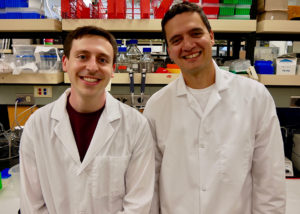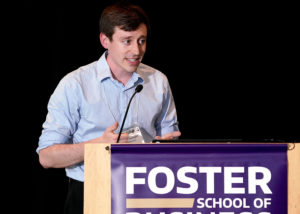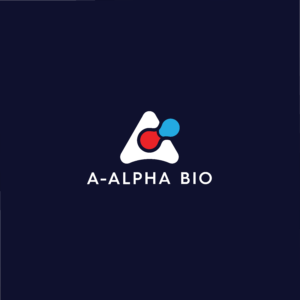Inside A-Alpha Bio’s $2.8 Million Fundraising Round
 Synthetic biology is not the catchiest of terms, nor the most easily understood. But it may just be the thing that revolutionizes medicine in ways we only speculated about years ago. Certainly that’s the potential of University of Washington spinout A-Alpha Bio, which recently announced a successful $2.8 million seed round of fundraising. A-Alpha Bio uses AlphaSeq (pronounced Alpha-seek) technology in a drug discovery platform that can “sort through millions of protein interactions at once.” In simple terms, the technology could speed up how quickly new, safe drugs reach the market.
Synthetic biology is not the catchiest of terms, nor the most easily understood. But it may just be the thing that revolutionizes medicine in ways we only speculated about years ago. Certainly that’s the potential of University of Washington spinout A-Alpha Bio, which recently announced a successful $2.8 million seed round of fundraising. A-Alpha Bio uses AlphaSeq (pronounced Alpha-seek) technology in a drug discovery platform that can “sort through millions of protein interactions at once.” In simple terms, the technology could speed up how quickly new, safe drugs reach the market.
The Foster School’s Buerk Center for Entrepreneurship first engaged with A-Alpha Bio co-founder and CEO David Younger (PhD Bioengineering ’17) at the 2017 Science and Technology Showcase and has supported and provided resources to A-Alpha Bio ever since. Younger’s team won the 2018 Hollomon Health Innovation Challenge, then won the 2018 UW Business Plan Competition (now called the Dempsey Startup Competition) and completed the Jones + Foster Accelerator. Younger and A-Alpha Bio has also received support from UW CoMotion including company space inside CoMotion Labs Fluke Hall.
Younger spoke with us about this latest milestone.
Q: What does this seed round tell you about how investors see A-Alpha Bio?
Younger: It clearly shows that there is an interest in our technology and an excitement about what we can do, the team, and our capabilities and achievements so far. More broadly than that, the general fundraising environment right now is very strongly indicating an excitement about synthetic biology and next-generation sequencing spaces. We’re very excited to be a part of using cutting-edge technologies to help the way pharmaceutical companies develop new drugs.
Q: Can you tell us more about how your team has grown and you have grown in your role as CEO?
 Younger: Three months ago, we were 2–3 people and now we’re at five full-time. So we’ve doubled over the course of just a couple of months, which has been incredibly exciting. My frustration as CEO is that I’m not able to directly contribute to the work in the lab as I used to as a graduate student. I still get to touch data and get into the science, but that’s not where I am on a day-to-day basis. So now having the four people who are really focused on lab work—the pace of what we can do and the pace that we can make significant scientific improvements and data went up enormously.
Younger: Three months ago, we were 2–3 people and now we’re at five full-time. So we’ve doubled over the course of just a couple of months, which has been incredibly exciting. My frustration as CEO is that I’m not able to directly contribute to the work in the lab as I used to as a graduate student. I still get to touch data and get into the science, but that’s not where I am on a day-to-day basis. So now having the four people who are really focused on lab work—the pace of what we can do and the pace that we can make significant scientific improvements and data went up enormously.
The challenge on my end is the need to focus on other things. My main job is fundraising certainly when we’re in fundraising mode and then shifting over to business development. Working with potential partners and clients on selling our technology, on selling AlphaSeq. It’s really fun because the people we’re selling to are scientists, they are people in Pharma who really understand the value of our technology and our method. It’s been a rewarding transition for me.
Q: What does a fundraising round like this allow A-Alpha Bio to do?
Younger: Freeing, but with added responsibility, is a good way to kind of sum it up. What it means for our research program, which is the core focus of our company, is that we don’t have the same restraints that we had before. Grants are an incredibly powerful way to grow a company, but they are also limited. You apply with a very specific research plan and its your responsibility, if you are fortunate enough to get that grant, to conduct that research plan. Inevitably, the exact needs of your customers are not going to perfectly align with that research plan. There are going to be new challenges that come up that you aren’t necessarily going to have the flexibility to re-assign the resources from that grant to work on.
What this fundraising gives us the flexibility to do—and you know, we’re very fortunate to have a group of investors who really understand investing in companies like us, investing in highly technical companies—is we don’t have the same strings attached as we did with grants. We can be much more agile. We can pursue the real technical bottlenecks in real-time as they come up instead of being under the restraints of a research plan, we wrote six months prior. That is really valuable when we’re constantly learning new things from the conversations we’re having with customers and the new things we’re learning from results in the lab.
Q: What does the next year look like for A-Alpha Bio?
 Younger: From the start it’s felt like anything was possible. It’s been an exciting and fast-paced journey for us. When I think back to where we were a year ago, it was a team of two, me and Randolph Lopez (PhD Bioengineering ’18). We had just been awarded a Phase 1 NSF SBIR. We had just spun out and opened our own lab at Fluke Hall. It really felt at that point that anything was possible. To see where we’ve come in one years’ time is pretty remarkable. As much as we try to plan for the future and where we expect to be in the year—if we follow the trajectory that we’ve been following, we’re going to make some really exciting strides over the next twelve months.
Younger: From the start it’s felt like anything was possible. It’s been an exciting and fast-paced journey for us. When I think back to where we were a year ago, it was a team of two, me and Randolph Lopez (PhD Bioengineering ’18). We had just been awarded a Phase 1 NSF SBIR. We had just spun out and opened our own lab at Fluke Hall. It really felt at that point that anything was possible. To see where we’ve come in one years’ time is pretty remarkable. As much as we try to plan for the future and where we expect to be in the year—if we follow the trajectory that we’ve been following, we’re going to make some really exciting strides over the next twelve months.
Q: Are you able to find time to reflect on the progress you’ve made alongside your co-founder?
Younger: Yes! Trust and respect for a co-founder is probably the most important when starting a new company. If that weren’t the case between the two of us, I think we would both have a lot more sleepless nights. We are definitely going into uncharted territory—as any new startup founder is. But, having Randolph by my side, certainly makes that uncertainty and movement into the unknown much more comfortable and much more fun.
The way that I describe it to people is that with any endeavor like this you’re going to have highs and lows. But when you’re doing this type of work with a group of people you really respect, the lows are still low, but they aren’t lower than if you were doing it alone. But the highs, with a team, are just so much higher. It’s so exciting to be a part of this work and starting to act on our mission at A-Alpha Bio, with a group of people who are also excited about the work we do and the potential of our technology. Having them means the world to me. We want to keep things going and build off this momentum.
Q: Is there anything you want to add about this milestone?
Younger: Its incredibly exciting to have the validation of experts. In the case of OS Fund for example—a group that has invested in some of the most successful synthetic biology companies to date—having that backing is incredibly important to us and incredibly validating. But at the end of the day, our validation is going to come from our customers and forming partnership deals with pharmaceutical companies.
So yes, this is an important milestone. But we’re also at the very beginning of our journey. We need to take time to celebrate. But we also need to stay focused on what it really means to build a successful company rather than just a VC-backed one.
To learn more about A-Alpha Bio, head to their website aalphabio.com.
For more details about the academic and extracurricular offerings from the Buerk Center for Entrepreneurship, please visit startup.uw.edu.
